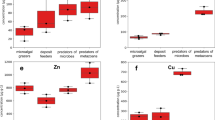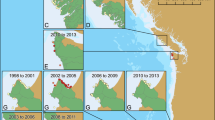Unexpected brevetoxin vectors may account for deaths long after or remote from an algal bloom.
Abstract
Potent marine neurotoxins known as brevetoxins are produced by the ‘red tide’ dinoflagellate Karenia brevis. They kill large numbers of fish and cause illness in humans who ingest toxic filter-feeding shellfish or inhale toxic aerosols1. The toxins are also suspected of having been involved in events in which many manatees and dolphins died, but this has usually not been verified owing to limited confirmation of toxin exposure, unexplained intoxication mechanisms and complicating pathologies2,3,4. Here we show that fish and seagrass can accumulate high concentrations of brevetoxins and that these have acted as toxin vectors during recent deaths of dolphins and manatees, respectively. Our results challenge claims that the deleterious effects of a brevetoxin on fish (ichthyotoxicity) preclude its accumulation in live fish, and they reveal a new vector mechanism for brevetoxin spread through food webs that poses a threat to upper trophic levels.
This is a preview of subscription content, access via your institution
Access options
Subscribe to this journal
Receive 51 print issues and online access
$199.00 per year
only $3.90 per issue
Buy this article
- Purchase on Springer Link
- Instant access to full article PDF
Prices may be subject to local taxes which are calculated during checkout

Similar content being viewed by others
References
Steidinger, K. A. in Algal Toxins in Seafood and Drinking Water (ed. Falconer, I.) 1–28 (Academic, London, 1993).
Geraci, J. R. Clinical Investigation of the 1987–1988 Mass Mortality of Bottlenose Dolphins along the US Central and South Atlantic Coast. Report to the National Marine Fisheries Service and US Navy, Office of Naval Research and Marine Mammal Commission (Ontario Veterinary College, Guelph, Ontario, 1989).
O'Shea, T. J., Bonde, R. K., Buergelt, C. D. & Odell, D. K. Mar. Mamm. Sci. 7, 165–179 (1991).
Van Dolah, F. M., Doucette, G. J., Gulland, F. M. D., Rowles, T. L. & Bossart, G. D. in Toxicology of Marine Mammals (eds Vos, J. G., Bossart, G. D., Fournier, M. & O'Shea, T. J.) 247–269 (Taylor & Francis, New York, 2003).
Bossart, G. D., Baden, D. G., Ewing, R. Y., Roberts, B. & Wright, S. D. Toxicol. Pathol. 26, 276–282 (1998).
Working Group on Marine Mammal Unusual Mortality Events The Bottlenose Dolphin (Tursiops truncatus): Unusual Mortality Event along the Panhandle of Florida March–April 2004 (National Marine Fisheries Service, 2004).
Baden, D. G. & Mende, T. J. Toxicon 20, 457–461 (1982).
Pierce, R. H., Henry, M. S., Blum, P. & Payne, S. in Harmful Algal Blooms 2000 (eds Hallegraeff, G. M. et al.) 421–424 (Intergovernmental Oceanic Commission, Paris, 2001).
Ross, P. S. Hum. Ecol. Risk Ass. 6, 29–46 (2000).
Author information
Authors and Affiliations
Corresponding author
Ethics declarations
Competing interests
The authors declare no competing financial interests.
Supplementary information
Rights and permissions
About this article
Cite this article
Flewelling, L., Naar, J., Abbott, J. et al. Red tides and marine mammal mortalities. Nature 435, 755–756 (2005). https://doi.org/10.1038/nature435755a
Published:
Issue Date:
DOI: https://doi.org/10.1038/nature435755a
This article is cited by
Comments
By submitting a comment you agree to abide by our Terms and Community Guidelines. If you find something abusive or that does not comply with our terms or guidelines please flag it as inappropriate.



